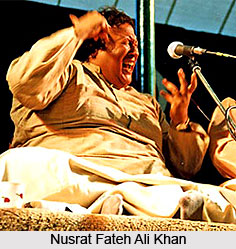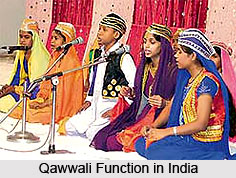 Originally performed at Sufi shrines throughout what is now India and Pakistan, it has also gained mainstream popularity. Qawwali music received international exposure through the work of the late Nusrat Fateh Ali Khan of Pakistan, who was picked up by the Real World label and also collaborated with many non-Sufi musicians in crossover efforts.
Originally performed at Sufi shrines throughout what is now India and Pakistan, it has also gained mainstream popularity. Qawwali music received international exposure through the work of the late Nusrat Fateh Ali Khan of Pakistan, who was picked up by the Real World label and also collaborated with many non-Sufi musicians in crossover efforts.
Origin of Qawwali
Qawwali has its root back to 8th century Persia, however Amir Khusrau created the form of today in the late 13th century in India. He fused the Persian and South Asian musical traditions to create Qawwali. In Central Asia and Turkey, it is known as Sama and even in India and Pakistan, Mehfil-e-Sama is the formal term used for Qawwali. The Qawwali songs are mostly heard in Urdu and Punjabi, but they are also available in Persian, Brajbhasha and Siraiki. The fascination of Qawwali can be enjoyed in some regional languages also but the sound of it is quite different from the conventional counterpart. For example, Chhote Babu Qawwal sings in Bengali whose tune is much like Baul music than the Qawwali of Nusrat Fateh Ali Khan.
In the Indian subcontinent four major Sufi Tariqas (orders) have formed a strong base, these are: Chistiya, Qadiriya, Suhrawardiyya and Naqshbandiya. Amongst these four, the Chistiya order has contributed the most to the patronisation and proliferation of qawwali in the subcontinent. As Sufism spread through this region imbibing its local flavours, languages, customs and cultural practices, qawwali too has undergone several changes. One can find Marathi, Dakhini and Bangla qawwali adding to the already existing repertoire of Indic qawwali performances.
Lyrics of Qawwali
The songs, which constitute the qawwali range, are mostly in Urdu and Punjabi, though there are several songs in Persian, Brajbhasha and Siraiki. The central themes of qawwali are love, devotion and longing (of man for the Divine).
Lyrics of Qawwalis are classified by their content into several categories, they are Hamd or praise of allah, Naat or praise of Muhammad, Manaqib or praise of either Imam Ali or one of the Sufi saints, Marsiya or lamentation for a dead person, Ghazal or love song, Kafi or Punjabi poems, Munajaat or conversation in the night or a form of prayer.
Features of Qawwali Songs
Songs in Qawwali are usually between 15 to 30 minutes long. However, the longest commercially released Qawwali runs slightly over 115 minutes. The qawwali maestro Nusrat Fateh Ali Khan has at least two songs that are more than 60 minutes long. Qawwalis tend to begin gently and build steadily to a very high energy level in order to induce hypnotic states both among the musicians and within the audience.
 Composition of Qawwali Group
Composition of Qawwali Group
A Qawwali group consists of eight or nine men including a lead singer, one or two side singers, one or two harmoniums and percussion. There is also a chorus group of four or five men who repeat key verses, and who help and back up percussion by continuous and rhythmic hand clapping. The performers generally sit in two rows with the lead singer, side singers and harmonium players in the front row, and the chorus and percussionists in the back row. The harmonium got preferred in Qawwalis as the earlier used sarangi needed to be retuned between songs.
They start with an instrumental prelude where the main melody is played on the harmonium, accompanied by the tabla, and which may include improvised variations of the melody. Then comes the alap, a long tonal improvised melody during which the singers intone different long notes, in the raag of the song to be played. The lead singer begins to sing some preamble verses, which are typically not part of the main song, although thematically related to it. These are sung not rhythmically, but improvised following the raag, and accompanied only by the harmonium. After the lead singer sings a verse, one of the side singers will repeat the verse, perhaps with his own improvisation. A few or many verses will be sung in this way, leading into the main song.
As the main song begins, the tabla, dholak and clapping begins. All members join in the singing of the verses that constitute the refrain. Normally neither the lyrics of the main verses nor the melodies that go with them are improvised. In fact, these are often traditional songs sung by many groups, especially within the same lineage. As the song proceeds, the lead singer or one of the side singers may break out into an alap. Nusrat Fateh Ali Khan also popularized the interjection of sargam singing at this point. The song usually builds in tempo and passion, with each singer trying to outdo the other in terms of vocal acrobatics. Some singers may do long periods of sargam improvisation, especially alternating improvisations with a student singer.
Famous Qawwali Singers
Chanchal Bharati is one of the eminent singers from the qawwal group from India. Zaki Taji Qawwal along with his elder son Mohammad Zaman Zaki Taji lead the male team of this group. It has always been a fight between love and beauty, which ends in compromise. Some famous qawwals are Aziz Mian, Badar Ali Khan, aka Badar Miandad, Bahauddin Qutbuddin, Fateh Ali Khan, Habib Painter, Iqbal Hussain Khan Bandanawazi, Munshi Raziuddin, Nizami Bandhu, Nusrat Fateh Ali Khan, Sabri Brothers, Wadali Brothers, Warsi Brothers, Qutbi Brothers etc.
Women used to be excluded from traditional Muslim music, since they are traditionally prohibited from singing in the presence of men. These traditions have changed, as is evident by the popularity and acceptance of female singers such as Abida Parveen. However, qawwali has remained an exclusively male business. There are still no mainstream female qawwals. Although kafi singer Abida Parveen has increasingly incorporated qawwali techniques into her performances, she is still not considered a qawwali singer.
People have always lapped up Qawwalis, especially those with two groups, each trying to outwit the other with poetry and innovative style of rendition. Qawwali has entered the big fat Indian weddings too. It is in danger of being upstaged by qawwali nights, now a regular feature in weddings, where budgets are not an issue.




